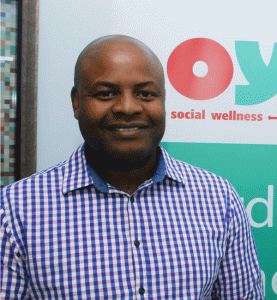
Johannesburg-based tech entrepreneur Tamsanqa Ngalo is the founder and CEO of Oyi, a healthtech startup which addresses inequalities in healthcare access in South Africa.
Oyi is an innovative medical expense card designed to enable low-income earners affordable access to private healthcare providers. It provides an affordable pay-as-you-use alternative to cover day to day medical expenses for the over 12 million income earners who cannot afford a medical-aid.

Ngalo, who has gone through his fair share of challenges to bring his product to market, shares the 3 biggest mistakes he sees South African tech entrepreneurs making.
We need to spend more time understanding our client better, what they eat, where they spend, what they [can] afford
1. Not taking into account South Africa’s diversity and socio-economic differences
Not every person in a certain age group enjoys the same lifestyle and this is where we confuse our target market. You find an entrepreneur with an excellent idea to solve a real-life problem but struggles with execution because the solution is not packaged well for the target market.
For example, a solution delivered through a mobile application assumes that a great percentage of the target market has a smartphone; the smartphone has enough memory to store the app; the client can afford the data required to download and engage with the mobile app; and lastly, which is probably more important, we assume that a client with a Facebook app on their phone will be just as happy to use our app, forgetting that everything has relevance, context, place and a time.
We need to spend more time understanding our client better, what they eat, where they spend, what they [can] afford, their preferences and so forth. The tech that we produce must complement the client’s activities and not be obtrusive.
The idea is to invest as little of your resources as possible and do just enough to attract the first few clients and use their feedback to retire, adjust or add features
2. Over-engineering the product without market feedback
We have the notion of over-engineering and over complicating our products even before we have signed up one client. We believe that every successful tech product must be a mobile app with geo-positioning and notifications popping everywhere and in the process neglecting our customer. For a startup, this is a wasteful utilisation and mismanagement of scarce resources.
The idea here is to invest as little of your resources as possible and do just enough to attract the first few clients and use their feedback to retire, adjust or add features. The ideal state is where the engineering is guided by what the client wants rather than what the entrepreneur thinks is cool.
Competition is tight and it’s up to us to sell a ‘fundable’ story
3. Not appreciating how difficult securing funding will be
In the tech space, [funding] complicated by an avalanche of new ideas and technological innovations. As much as this is a good indication of an active generation of thinkers with an entrepreneurial acumen, this abundance of tech startups complicates the selection process to say which of these hundreds of ideas that all sound brilliant have sustainability and a potential to scale.
This is where we, as tech entrepreneurs, need to work harder to simplify the process by clearly articulating what it is that differentiates our offering to the rest. Competition is tight and it’s up to us to sell a ‘fundable’ story.


